07 Oct2019
By Danny Carlson
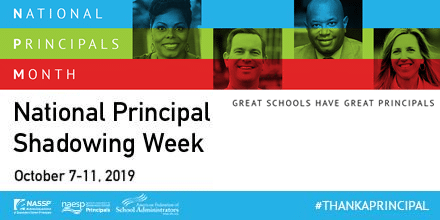
October is National Principals Month —a month to honor our nation’s principals and the important work they do leading schools. Led by the National Association of Elementary School Principals (NAESP), the National Association of Secondary School Principals (NASSP), and the American Federation of School Administrators (AFSA), this annual celebration recognizes our nation’s principals for their tireless dedication to their students and the schools they serve.
To effectively lead a school, today’s principal must fulfill the role of instructional leader and create the learning conditions to support teaching and learning. To do this, principals are in classrooms, observing instruction, engaging with teachers in the nuts-and-bolts of leading learning communities, and connecting teachers with professional learning opportunities. Thus, principals are now more than ever multipliers of effective teaching and possess an enormous capacity to impact student achievement.
Simply put: You can’t have a great school without a great principal. Whether it’s supporting their teachers, ensuring students have access to nutritious meals, or making parents and families feel engaged and welcome their child’s school, principals make it happen.
Despite the many rewarding aspects of the principalship and its importance in improving teaching quality and boosting student outcomes,
03 Oct2019
By Leslie-Hull-Ryde
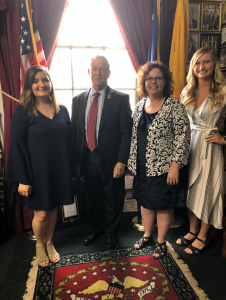
Students and faculty from the University of South Carolina Aiken headed to Washington to meet with legislators and learn about trends in education policy from leaders in the field, all as part of the American Association of Colleges for Teacher Education’s annual Washington Week.
“The primary goal of the trip was to collaborate with the American Association of Colleges for Teacher Education and engage with staffs of the South Carolina representatives and senators,” said Tiffany Zorn, a USC Aiken education major.
“This experience permitted us to expound upon particular bills that aid with teacher preparation as well as [champion] the necessity to continue funding the Teach Grant and reevaluate the data gathered within the teaching profession. Without voices to be advocates, our teachers’ stories would never be heard, and no progress would ever truly be made.”
AACTE is considered “the leading voice on educator preparation,” according to its website, which also states that AACTE represents more than 800 postsecondary institutions with educator preparation programs, like USC Aiken.
03 Oct2019
By National Education Policy Center

In 2011, renowned academic, lecturer, and author Robin DiAngelo coined the term “white fragility” in an academic article, which influenced the national dialogue on race. DiAngelo will take center stage as the opening keynote speaker at the 2020 AACTE Annual Meeting on Friday, February 28 in Atlanta, GA.
The following article originally appeared in the National Education Policy Center newsletter and is reprinted with permission.
Public school enrollment has been majority “minority” since 2014. Yet roughly 80% of teachers are White. Although it’s not easy to get data on the racial makeup of local school boards, a 2010 survey suggests about 80% are White. State legislators, who typically call the shots on K-12 policy and funding, are also about 8 % White.
So how are educators and policymakers dealing with this glaring gap between the demographics of the people who implement and make education policy and the students who live its results? How are they handling the even bigger chasm between the societal and educational opportunities offered to White students versus students of color?
In many cases, they’re not.
03 Oct2019
By Paul Floeckher
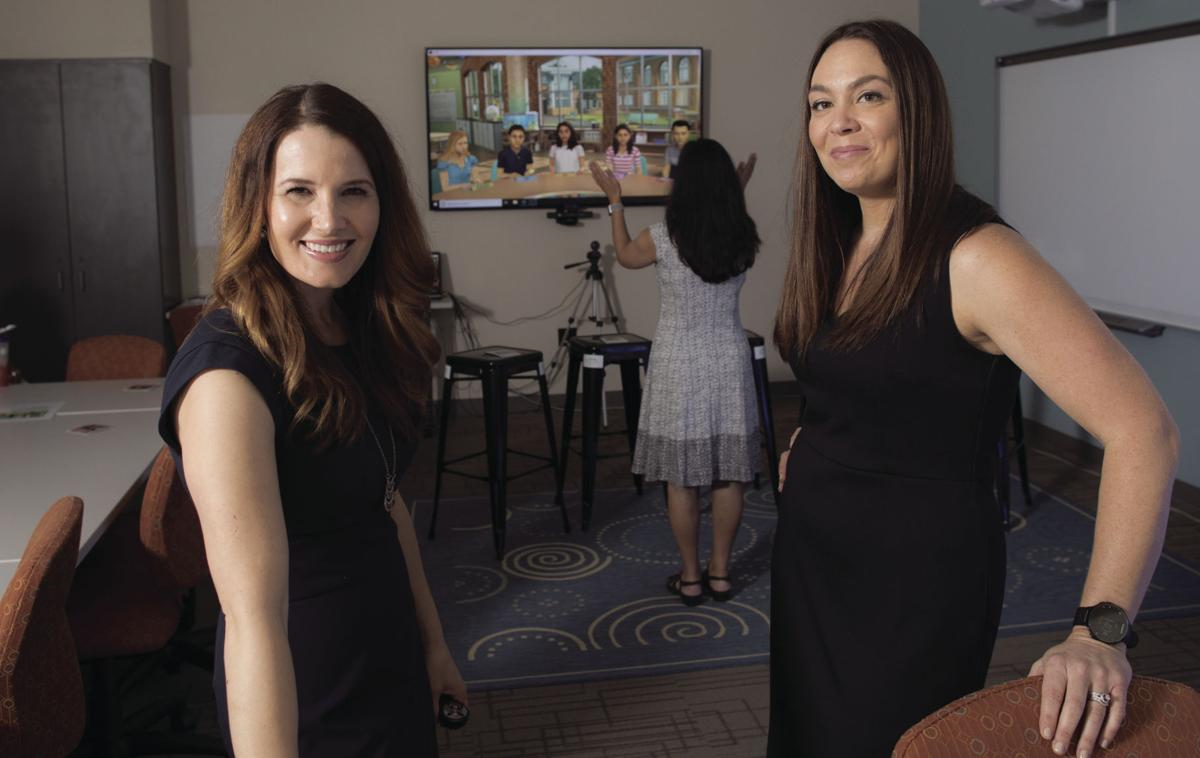
This article and photo originally appeared in Cobb Life Magazine and are reprinted with permission.
Teachers encounter all sorts of situations when they’re instructing students in the classroom, and the Bagwell College of Education at Kennesaw State University is taking an animated approach to preparing teacher candidates for scenarios they will experience as educators.
Bagwell has a new laboratory where KSU students and faculty utilize mixed-reality technology to interact with avatars of children and adults, simulating a variety of situations and challenges teachers can encounter. The student avatars each have their own unique personalities, and the scenarios have low, medium and high settings requiring varying levels of problem-solving.
“The lab’s capabilities are endless for providing purposeful practice for teacher candidates before they ever step foot in a classroom,” said Kate Zimmer, interim chair of the Department of Inclusive Education and an associate professor of special education.
03 Oct2019
By JTE Insider

Read the latest JTE Insider blog interview by the Journal of Teacher Education (JTE) editorial team member Lauren Snead. This blog is available to the public, and AACTE members have free access to the articles in the JTE online archives—just log in with your AACTE profile.
This interview features insights from the article “Rethinking Student Teacher Feedback: Using a Self-Assessment Resource With Student Teachers” by Lauren Oropeza Snead and H. Jerome Freiberg. The article was published in the March/April 2019 issue of the JTE.
Q1. What motivated you to pursue this particular research topic?
As a doctoral student in Dr. Jerome Freiberg’s graduate class, I was challenged to self-assess my own teaching by using student feedback. This was an area of growth I had not previously explored and it completely changed the way I looked at my teaching. As I briefly discuss in the article, I had spent many years as a K-12 teacher, where I focused on what administrators thought of me. Up until this point, my teaching evaluations dictated how I taught my class. I based any areas of growth or changes on what the administrators said about my classroom. Now that I look back, I cannot believe how blind I was to all of the potential feedback perspectives in classrooms. Using Dr. Freiberg’s self-assessment resource, the Person-Centered Learning Assessment (PCLA), I realized for the first time that the power for change started with my students. Accessing student feedback gave me a fresh perspective into areas of growth. It was an empowering experience. That experience spurred on my curiosity to dive further into the PCLA.
02 Oct2019
By Jerrica Thurman
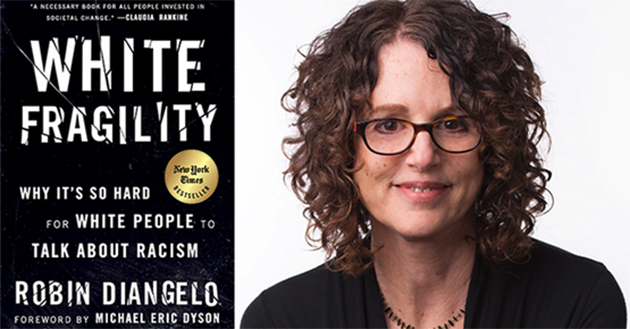
AACTE is pleased to announce renowned academic, lecturer, and author Robin DiAngelo will headline the 2020 Annual Meeting, February 28 – March 1 in Atlanta, GA. She will take center stage as the opening keynote speaker on Friday, February 28.
DiAngelo serves as the affiliate associate professor of education at the University of Washington, where she teaches courses in multicultural teaching, inter-group dialogue facilitation, cultural diversity and social justice, and anti-racist education. She is widely recognized for her research in critical discourse analysis and whiteness studies.
In 2011, DiAngelo coined the term “white fragility” in an academic article, which influenced the national dialogue on race. Her book, White Fragility: Why It’s So Hard For White People To Talk About Racism, was released in June 2018 and debuted on the New York Times Bestseller List.
Read more about DiAngelo and how you can join in “Disrupting Inequities: Educating for Change” during the Annual Meeting!
The October 30 early bird registration deadline is quickly approaching! Take advantage of discounted rates for the AACTE 72nd Annual Meeting by securing your spot today! Visit aacte.org for conference details, follow us on Twitter and Facebook, and join the conversation using #AACTE20.
Come experience the new AACTE Annual Meeting – One community. One purpose. One place.

Questions – Need Assistance?
Please contact us at events@aacte.org
02 Oct2019
By Linda Minor
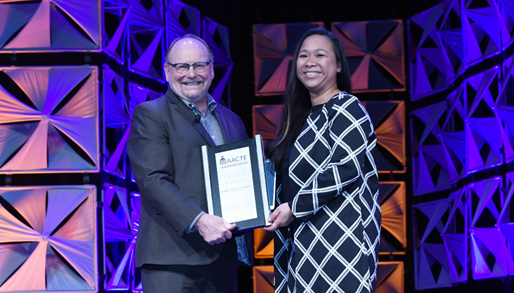
Have you thought about submitting and entry for an AACTE Award? Have you or a colleague completed work that you feel should be noticed and deserves to be recognized? The good news is that there is still time to nominate or submit an entry for the 2020 Best Practice and the 2020 Professional Achievement Awards, recognizing member institutions and individuals, respectively, for their significant contributions to the field of educator preparation:
Best Practice
- Best Practice Award for the Innovative Use of Technology
- Best Practice Award in Support of Global and International Perspectives
- Best Practice Award in Support of Multicultural Education and Diversity
Professional Achievement
- Margaret B. Lindsey Award for Distinguished Research in Teacher Education
- David G. Imig Award for Distinguished Achievement in Teacher Education
- Edward C. Pomeroy Award for Outstanding Contributions to Teacher Education
The deadline to submit your entry is Wednesday, October 9, 2019.
02 Oct2019
By Valerie Owens
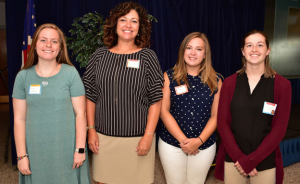 Shepherd University’s School of Education received a $40,635 grant from the West Virginia Department of Education to continue working with five Berkeley County Schools providing professional development and to start a pilot program in which a select group of Shepherd student teachers spend the entire school year in a Berkeley County elementary school.
Shepherd University’s School of Education received a $40,635 grant from the West Virginia Department of Education to continue working with five Berkeley County Schools providing professional development and to start a pilot program in which a select group of Shepherd student teachers spend the entire school year in a Berkeley County elementary school.
“The teacher candidate goes in from day one and works with the mentor teacher in co-planning, co-teaching, and co-assessing,” said Dori Hargrove, Shepherd’s elementary specialization coordinator. “By being involved from the first day, the teacher candidate gets a better understanding of all the decisions that go into planning. It helps the teacher candidate feel more prepared and helps the mentor teacher learn new strategies.”
Four Shepherd elementary education majors are participating in the pilot program—Kristin Williams, Charles Town; Susan Stambaugh, Martinsburg; Kayla Shultz, Falling Waters; and Alexis Shearer, Chambersburg, Pennsylvania. The typical length of time for student teaching is 14 weeks; however, the four are co-teaching in a school the entire year.
30 Sep2019
By Ward Cummings
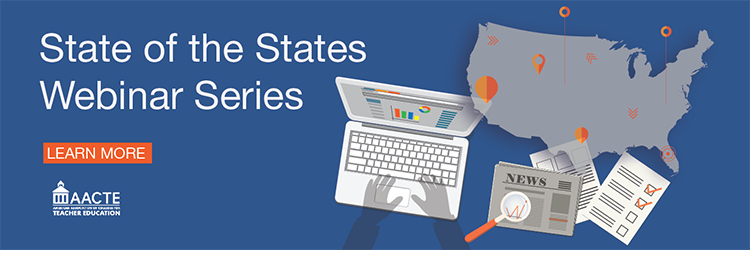
Most of the state legislatures around the country have adjourned for the year. During the session, legislators introduced more than one hundred thousand individual pieces of legislation, of which hundreds focused on the teaching profession and the preparation of teachers. In the September 2019 State of the States Legislative Roundup webinar, AACTE offered an overview of education-related bills introduced over the year.
Each month, these state-focused policy and legislation webinars will examine a particular theme; October’s theme is school safety. If you or your colleagues are doing specific work around school safety—including campus safety, social-emotional learning, integrating trauma-informed instruction into your curriculum, or other related work— we encourage you to submit a blog. Learn more about the submission guidelines.
We hope you view the recording of September’s webinar and stay tuned for a blog when October’s registration opens. This webinar series is designed to help AACTE members stay abreast of the actions of state legislatures around the country that impact the profession, and we encourage you to attend.
27 Sep2019
By Jane E. West
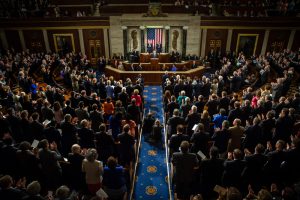
This blog post is written by AACTE consultant Jane West and is intended to provide update information. The views expressed in this post do not necessarily reflect the views of AACTE.
It’s been a breathtaking week in Washington as minute-to-minute developments unfold in the House’s decision to pursue impeachment of President Trump. Yet, both congressional bodies continue to move on their legislative agendas. The question becomes, how much oxygen will impeachment suck up and will there be any space left for anything else? And remember the Congress leaves town today for a two-week recess, to return with less than 30 legislative days scheduled before the end of the year! Of course, this could change.
27 Sep2019
By Ward Cummings
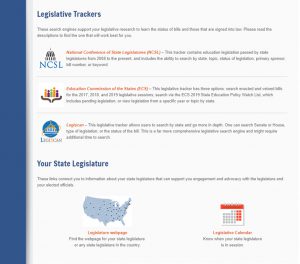
Would you like to learn more about the resources AACTE has pulled together to support its members in their state level legislative research? AACTE Government Relations Committee member Allen Clarkson will host a webinar describing the features of AACTE’s new state legislative resource page on Thursday, October 3, from 11am to Noon EDT.
Attend this webinar to learn how to use the three legislative search engines and other resources found on this new page to pursue your legislative research and advocacy goals. There will be time at the end of the webinar to get your questions answered. The webinar will be recorded and posted on the website as well.
Register now for the Introducing AACTE’s New Legislative Resource Webpage webinar.
27 Sep2019
By Katrina Norfleet
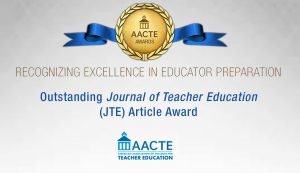
The Outstanding Journal of Teacher Education Article Award is presented annually by AACTE to recognize exemplary scholarship published in the Journal of Teacher Education (JTE) during the last volume year. The journal’s editors, based at Michigan State University, nominate several top articles for consideration, and the AACTE Committee on Research and Dissemination selects the winning paper to receive the award. This award represents one of the nine categories of the annual AACTE Award Program that recognizes excellence in educator preparation.
In the video below, JTE Co-Editor Robert Floden highlights the 2018 AACTE Outstanding Journal of Teacher Education Article Award winner, “Capturing the Complex, Situated, and Active Nature of Teaching Through Inquiry-Oriented Standards for Teaching.” In this article, the authors, Claire Sinnema, Frauke Meyer, and Graeme Aitken of the University of Auckland, identify problems in the design and implementation of teaching standards that widen the divide between theory and practice, and propose an alternative model dubbed Teaching for Better Learning.
26 Sep2019
By Govinda Budrow
The excerpt below is taken from an article originally published on the American Indian College Fund website and is reprinted with permission.
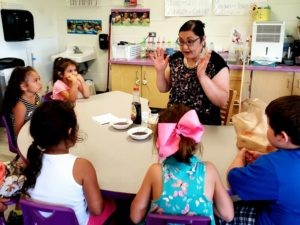
When it comes to STEM, it may be the roots that hold us in the field, the classroom, and in our love for science, technology, engineering, and mathematics.
As Native Americans, there has been a complicated history and relationship with formalized education. Beginning with boarding schools and day schools that mandated assimilation and rejection of Indigenous community languages and wisdom, the disruption has spanned for well over a century, with the abusive boarding school era coming to a close as late as the 1970s. Each generation since these boarding schools struggles with the false dichotomy that one can either be Indigenous or do well in school.
26 Sep2019
By Jerrica Thurman
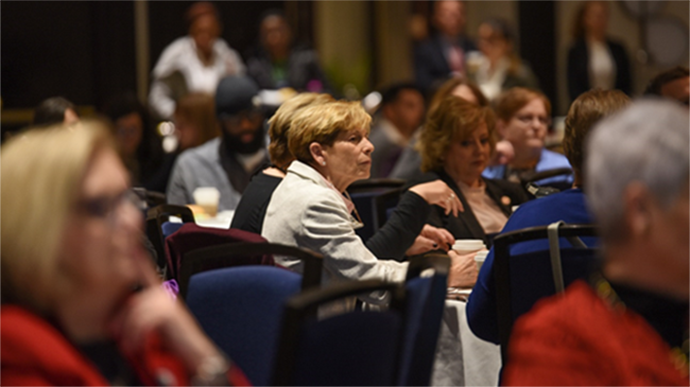
AACTE’s engaging concurrent sessions, known as Learning Labs, are returning to the 2020 Annual Meeting in Atlanta, GA. As an attendee from last year noted, “The practical sessions with actual implementation stories stood out as exemplary.” In the Learning Labs you too will receive inspiring content and tangible practices to implement in your daily work.
Come experience these enhanced sessions, categorized by these types:
- Case Stories sessions feature quality storytelling designed to illuminate real world case studies that demonstrate innovation or breakthrough practices.
- Data to Action sessions release recent data in ways that encourage attendees to discuss its relevance and practicality in everyday settings.
- Future Casting sessions explore the creation of “next practices” as opposed to and/or in addition to exploring current best practices.
- Paper Sessions feature two presentations focused on a similar topic centered around the event strands.
- Perspectives sessions address a current topic or concern that is germane to educator preparation framed as a research, policy, or program question.
- Roundtables sessions focus on a particular topic and are led by an individual or a small group.
- Scenario Planning sessions help attendees consider and discuss a variety of actions that might take place as a result of changing conditions.
AACTE continues to elevate the quality of its educational offerings and attendee engagement at its Annual Meeting. Come experience the reimagined offerings at the AACTE 72nd Annual Meeting, February 28 – March 1. Register now and take advantage of early bird rates by October 30. Visit aacte.org for conference details, follow us on Twitter and Facebook, and join the conversation using #AACTE20.

Do you have questions or need assistance? Please email events@aacte.org.
26 Sep2019
By Michael Staton
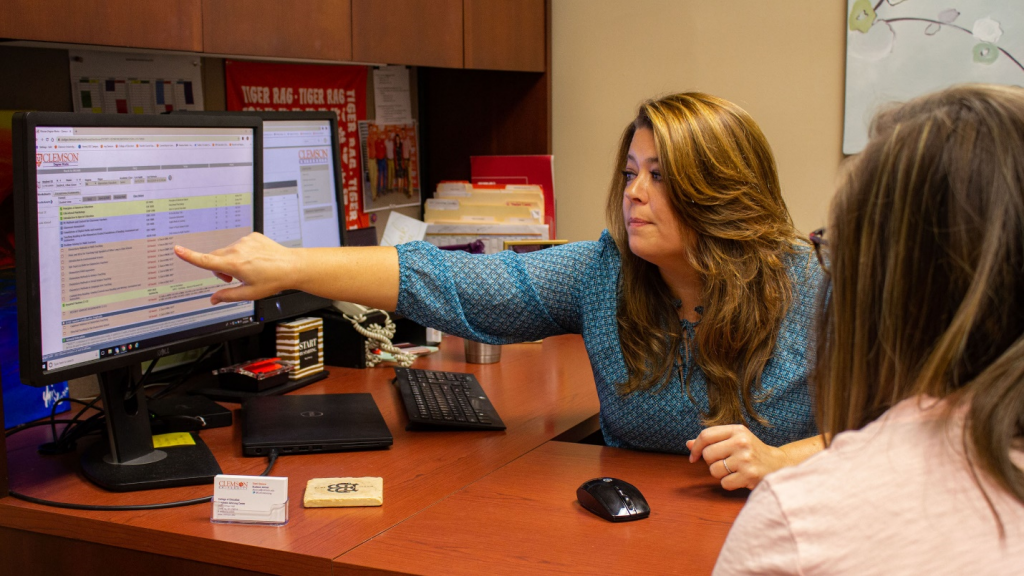 This article originally appeared in the Clemson University Newstand and is reprinted with permission.
This article originally appeared in the Clemson University Newstand and is reprinted with permission.
This fall, Clemson’s College of Education has become the first on campus to adopt a college-wide, four-year advising model for its undergraduates. College leadership and student advisors worked collaboratively to develop this approach, which they say aligns the college more closely with the Clemson Forward strategic plan.
This model positions academic advisors to manage all tasks related to student scheduling and degree completion, while faculty members become involved once students transition to the professional level of their respective program area. According to Michelle Cook, associate dean for undergraduate studies in the college, the move will be a true “win-win” for faculty, staff and students in the college as well as the college’s partner school districts.
“Our college prides itself on the personal attention we









 Shepherd University’s School of Education received a $40,635 grant from the West Virginia Department of Education to continue working with five Berkeley County Schools providing professional development and to start a pilot program in which a select group of Shepherd student teachers spend the entire school year in a Berkeley County elementary school.
Shepherd University’s School of Education received a $40,635 grant from the West Virginia Department of Education to continue working with five Berkeley County Schools providing professional development and to start a pilot program in which a select group of Shepherd student teachers spend the entire school year in a Berkeley County elementary school.





 This article originally appeared in the
This article originally appeared in the